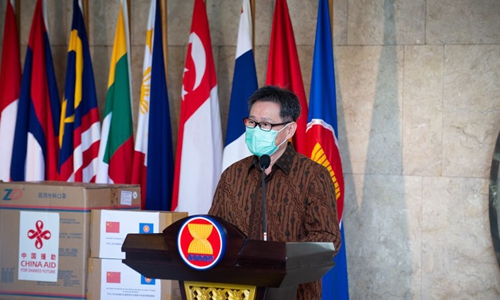
Secretary-General of the Association of Southeast Asian Nations (ASEAN) Lim Jock Hoi speaks during a handover ceremony of medical supplies donated by China at the ASEAN Secretariat Building in Jakarta, Indonesia, April 21, 2020. (Xinhua/Du Yu)
After early success in containing the coronavirus, Singapore suddenly emerged as Asia's third most infected nation after China and India. The island-nation just overtook Japan with the total number of infections exceeding 13,000, which somehow indicates the gravity of the situation given the nation's small population.
Now is the time to look into how China and Singapore can work together to fight the global pandemic. Transparent and timely technology exchange and medical information sharing are undoubtedly essential. But more importantly, the coronavirus has changed a lot of things, and there will be no going back to the life before the pandemic, which is why early discussions are needed on cooperation over a wide range of issues from bringing the virus under control as soon as possible to how to cushion its blow in the future.
And it is not just Singapore but the Association of Southeast Asian Nations (ASEAN) as a whole that needs to think about strengthening their cooperation with China in the battle against the global pandemic. China has done a good job in effectively preventing the spread of the virus and has accumulated valuable experience during the process. So the ASEAN-China cooperation will be conducive to the establishment of a regional public health warning mechanism to mitigate the impact of the pandemic on public health, trade and travel in the post-COVID-19 period.
From China's perspective, ASEAN nations are at different stages of virus outbreaks with the severity varying from country to country. This means that a one-size-fits-all approach is not suitable for the regional public health cooperation between China and ASEAN, which needs to be carried out based on each country's unique conditions. The Belt and Road Initiative (BRI) may just fit the need to seek a more inclusive regional cooperation framework, which could extend the cooperation coverage to pandemic prevention and control as well as joint efforts to deal with economic shocks.
Moreover, the pandemic has had a profound impact on the tourism, trade, and industrial chains in ASEAN countries and China, which will not go back to the normal of the pre-coronavirus. For instance, Thailand is almost certain to step up exchanges with China to revive its crushed tourism. But a good cooperation needs time to talk, this is why China and ASEAN need to start strengthening communications and discussions on how to make use of the BRI framework to seek better cooperation to promote economic development between the two sides.
In addition, while the US is overwhelmed by its domestic public health emergency, its influence is undeniable in the geopolitical landscape in the Asia-Pacific region. It also takes time for ASEAN and China to factor in the US influence in their future cooperation and regional economic restructuring.



